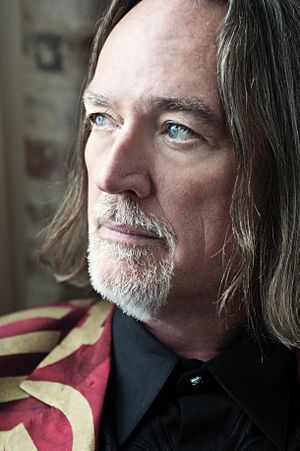Bradford Keeney facts for kids
Quick facts for kids
Bradford Keeney
|
|
|---|---|
 |
|
| Born | 1951 Granite City, Illinois, US
|
| Known for | family systems therapy, brief therapy, systems psychology, Creativity in Therapy, Resource Focused Therapy, Recursive Frame Analysis, Psychotherapy as a Transformative Art |
| Scientific career | |
| Fields | cybernetics, psychology, brief therapy, radical constructivism, Systems theory, ecstatic healing traditions |
Bradford Keeney, born in 1951, is a special kind of therapist, a scientist who studies systems, and someone who learns about healing traditions from different cultures around the world. He's also a performer and a spiritual healer. Dr. Keeney has taught at many universities and created new ways of doing therapy, like "improvisational therapy" and "resource focused therapy." He also invented a research method called "recursive frame analysis" to understand how people talk and change. He's recognized for his important work in family therapy.
He has been called the "Marco Polo of psychology" because he traveled the world. He lived with spiritual teachers and healers for over ten years. They trusted him to share their ancient wisdom with modern cultures. His work resulted in a huge study of healing practices. This study is found in his book series, Profiles of Healing, which has eleven volumes.
Contents
Early Life and Education
Bradford Keeney was born in Granite City, Illinois. He grew up in Smithville, Missouri. In 1969, he won an award from the American Medical Association. He also won first place at an international science fair. This award helped him get a scholarship to M.I.T.. There, he first learned about cybernetics and systems thinking.
Cybernetics is the study of how systems control themselves and communicate. Systems thinking is a way to understand how different parts of something work together. Dr. Keeney was very interested in these ideas. He became friends with Gregory Bateson, a leading expert in cybernetics. Bateson became his mentor. Keeney's doctoral paper from Purdue University became his book Aesthetics of Change (1983). This book is seen as a very important work in cybernetics.
Bradford Keeney works with his wife, Hillary Keeney, PhD. They have written seven books together. He is also the father of a well-known DJ, DJ Skee.
Exploring Global Healing Traditions
Since 1995, Bradford Keeney has traveled the world. He studies "ecstatic healing traditions." These are healing practices that often involve intense movement or spiritual experiences, sometimes called "shaking medicine." His work led to the Profiles of Healing series. This series describes ecstatic healing practices from four different continents.
His experiences were written about in the biography American Shaman. Today, Dr. Keeney combines what he learned from traditional healers with creative psychotherapy. This helps make therapy more active and like a performance.
With his wife, Hillary Keeney, he started The Keeney Institute for Healing. This institute helps teach people about ecstatic healing and spirituality. The Keeney Institute offers training for healers, therapists, and the public. Their work connects to other ecstatic healing traditions. These include healing practices from the Kalahari Bushmen, the shakers of the Caribbean, and Japanese energy medicine.
Many cultures see Keeney as an ecstatic spiritual teacher and healer. He became a n/om-kxao (healer) with the Kalahari Bushmen. Experts say that the Bushman healers believe Keeney's healing power is like theirs. They confirmed his strength as a healer.
Contributions to Psychotherapy
Dr. Keeney has made several important contributions to psychotherapy. He did this by using ideas from cybernetics in therapy. He worked at places like the Menninger Foundation and the Philadelphia Child Guidance Clinic. He also worked at the Ackerman Institute for Family Therapy and many universities. During this time, he developed new ideas.
In his early work, Keeney described how famous therapists communicated. Later, he used his own therapy cases to show how therapy can be an art. This art helps create successful changes for clients. Some of his main books include Aesthetics of Change (1983) and The Creative Therapist (2009). In 2010, Bradford Keeney and his wife, Hillary Keeney, started an online doctoral program. This program focuses on creative systemic studies. It is the first of its kind to study cybernetics and systems thinking. These ideas are the foundation of family therapy.
Understanding Conversations with Recursive Frame Analysis
Keeney created Recursive Frame Analysis (RFA). This is a research method to find patterns in therapy conversations. He describes it like "scoring" a conversation, similar to how you would score a song. RFA helps therapists and researchers understand how people interact. It also guides their therapy practice.
RFA has been used in many research studies. It shows different ways to analyze conversations. This includes talks between couples and families, counseling sessions, and even political discussions.
Helping People with Resource Focused Therapy
With his colleague Wendel Ray, Keeney developed "Resource Focused Therapy." This therapy approach does not focus on problems or difficulties. Instead, it focuses entirely on "bringing out the natural strengths" of both clients and therapists.
This focus on strengths changes how the client sees the world. It is a creative way of communicating. It often looks more like an improvised play than traditional therapy. The goal is to help clients use their strengths and abilities more effectively.
Using Creativity in Therapy Sessions
Building on his Resource Focused Therapy, Keeney developed the idea of "creativity in therapy." This idea goes beyond normal therapy rules. It sees the therapist and client working together as a creative, improvisational art. This work is based on real therapy cases that have been filmed. The ideas use theories of improvisation from performing arts. They also use systemic ideas. This helps understand how therapy sessions can become more creative and helpful.
See also
- Complex systems
- Constructivist epistemology
- Cybernetics
- Family therapy
- Second-order cybernetics
- Systems thinking
- Systems psychology

